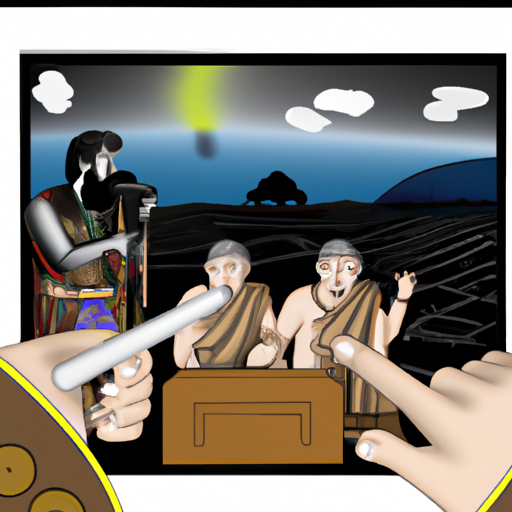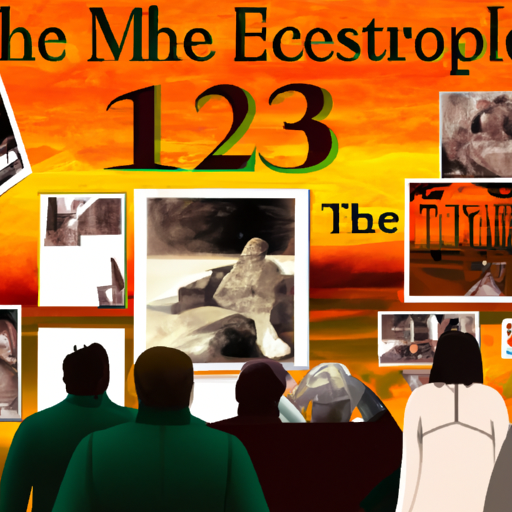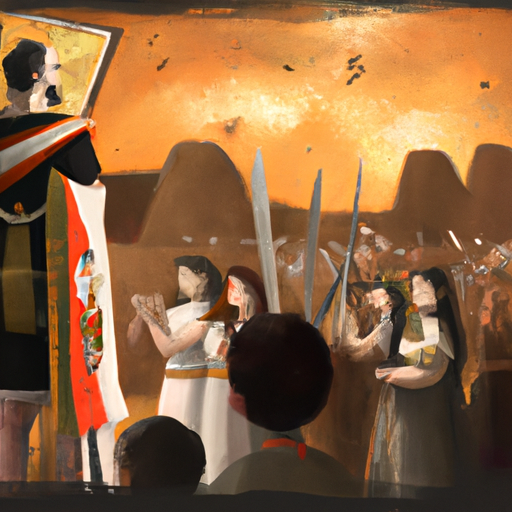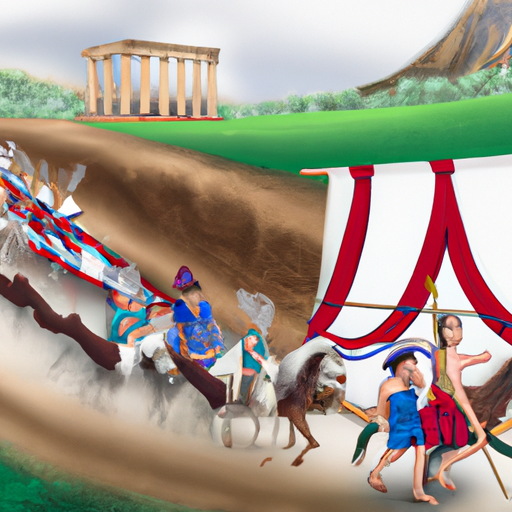History of Samurai Religion: Exploring the Faiths of Ancient Japan
Unveil the secrets of the samurai, to uncover their spiritual convictions! Delve into the past and explore the mysterious faith that guided these legendary warriors. Unearth their beliefs and gain a greater understanding of this powerful culture.

Mystery has always surrounded the samurai, a legendary part of Japanese culture. To understand their beliefs and practices, one must look to the code of bushido, or “the way of the warrior,” which places emphasis on honor, loyalty, courage, and self-discipline. The samurai also believed in a spiritual world and sought justice through their actions. Meditation was used to center themselves and sharpen their skills as warriors. Additionally, they practiced Zen Buddhism to find inner peace and clarity. Death was not seen as something to be feared but rather embraced as part of life’s cycle. The bravery and commitment to justice that the samurai exemplified is still admired today in popular culture like manga comics and anime films which often feature characters inspired by them. Through exploration of this powerful culture, we can gain insight into its lasting impact on Japanese society for centuries.
.
Introduction

A warrior class of great might, the samurai of Japan from the twelfth to nineteenth centuries lived by a code known as Bushido. A unique combination of Confucianism, Buddhism and Shintoism shaped the beliefs and practices of these noble fighters. Confucianism’s loyalty, obedience and deference to authority were integral to samurai life, while Buddhism helped provide spiritual direction and an awareness of life’s transience. Lastly, Shintoism connected them to deities thought to protect them in battle.
– The History of Samurai Religion
A mysterious and convoluted story lies behind the Samurai religion, a tale that stretches all the way back to the 8th century when this warrior class first appeared in Japan. Their code of honor, bushido, was heavily influenced by Buddhism and Shintoism and became the foundation of their spiritual beliefs and practices. This code was based on an understanding that life could be ordered and balanced by following bushido, which meant being courageous and loyal, showing respect for others, and honoring one’s ancestors. Furthermore, they believed in karma – cause-and-effect relationships between actions and consequences.
Ancestor veneration ceremonies were also held in Shinto shrines as a way to remember those who had passed away and thank them for their protection during battles or other difficult times. Additionally, many samurai took up Zen Buddhism as their primary spiritual practice; it taught them how to live simply with meditation at its core in order to achieve enlightenment, as well as how to build mental strength for use on the battlefield or in other challenging scenarios.
Though some aspects of Samurai religion are still practiced today – such as ancestor veneration or ritual purification ceremonies in Shinto shrines – Buddhism is far more popular throughout Asia than any other faith due to its long history.
– Shintoism and the Samurai: A Historical Perspective
For centuries, a deep-seated relationship has been established between Shintoism and the Samurai. Emerging during the Heian period (794-1185), the Samurai were a powerful warrior class whose culture and values were deeply rooted in the ancient Japanese religion. Emperor Shomu’s declaration of Shintoism as Japan’s state religion in the 8th century further fortified this connection.
The Samurai adopted many of the core tenets of Shintoism, such as loyalty to one’s lord, respect for authority, courage in battle, self-discipline, and reverence for nature. Furthermore, they incorporated various aspects of it into their lifestyle; for instance, they often visited shrines dedicated to various gods before going into battle or engaging in any important decision-making process. Additionally, purification ceremonies were also observed before entering combat.
These days, many aspects of Shintoism are still present in modern Japanese culture. People continue to visit shrines on special occasions like New Year’s Day or other holidays; likewise, traditional values associated with Samurai culture are still revered by many individuals living in Japan today.
It is clear that Shintoism and the Samurai have had an enduring relationship which has left its mark on contemporary Japanese society. Despite changes over time, their shared beliefs and values remain strong even today.
– Buddhism’s Role in Samurai History
The enigmatic, ancient Samurai, Japan’s revered warrior class, have had a long-standing relationship with Buddhism. Its teachings profoundly impacted their culture and way of life, instilling in them a code of conduct known as bushido – or “the way of the warrior.” This ethical system emphasized loyalty, courage and honor – all deeply rooted in Buddhist beliefs about karma and reincarnation.
Zen Buddhism also left an indelible mark on the Samurai. It taught them to focus solely on the present moment and disregard past or future worries; this enabled them to become highly skilled warriors who could remain composed even during battle. Meditation was another important element of Zen which helped develop mental clarity and inner peace. These practices gave rise to martial arts styles such as judo and karate that are still practiced today.
Buddhism’s influence extended beyond just martial arts; it also shaped many aspects of Samurai culture including art, literature, poetry, music and architecture. The Japanese tea ceremony is one example of how Buddhism melded with Samurai life; it combined elements from both cultures to create a ritual focused on mindfulness and harmony.
Ultimately, Buddhism had an immense effect on the history of the Samurai by providing them with an ethical code for living as well as spiritual guidance for mastering their own minds. Even centuries after their time, its legacy can still be seen in modern day Japan – a testament to its enduring influence.
– How Christianity Impacted Samurai History
Mystifyingly, the samurai and Christianity are inextricably linked. During the 16th century, Japan was exposed to this unfamiliar belief system, transforming the culture and values of these warriors of feudal Japan who served as retainers for powerful warlords and defended their lords’ lands from attack. The introduction of Christianity presented a challenging dilemma as many samurai found themselves struggling to reconcile their traditional ways with these new concepts. For some, this led to an acceptance; for others, it resulted in a rejection.
One instance of how Christianity impacted samurai history is Oda Nobunaga’s conversion. A renowned warlord during the 16th century credited with unifying much of Japan under his rule, Nobunaga was originally hostile towards Christianity but eventually changed his mind after being impressed by Jesuit missionaries’ knowledge and scientific advancements they brought with them from Europe. His transformation helped spread Christianity throughout Japan and opened up trade opportunities with European countries which allowed for further cultural exchange between Japan and Europe.
Christianity also had an effect on warfare during this period too. Values such as mercy and compassion were incorporated into Samurai codes of conduct which led to less brutal forms of combat being adopted by warriors during this time period. This shaped the way warfare was conducted in Japan for centuries afterwards as well as providing a moral framework for warriors to abide by when engaging in battle.
Ultimately, Christianity has left a lasting impression on Samurai history that can still be seen today in modern Japanese culture. It has affected not only how warfare is conducted but also how people view morality and justice within society as well as providing an opportunity for cultural exchange between European countries and Japan that would not have been possible without it.
– Examining the Influence of Confucianism on Samurai History
The samurai, a class of warriors who held sway in Japan for centuries, were heavily influenced by Confucian ideals and principles. This code of conduct, known as Bushido, was built upon values such as respect for authority and loyalty to one’s superiors. These teachings also extended to the samurai’s daily lives, with filial piety being practiced to show respect for elders and parents. Moreover, the samurai adopted Confucian principles into their strategies for warfare – “the way of righteousness” and “the way of loyalty” being among them – which encouraged honorable behavior even in times of conflict. Furthermore, many rituals associated with death or burials were based on Confucian beliefs about honoring ancestors, while certain ceremonies or festivals celebrated by the samurai had roots in Confucian traditions. It is even believed that some aspects of Bushido may have been inspired by Chinese martial arts practices influenced by Confucius’ teachings. All these factors demonstrate how profoundly Confucius’ philosophy has impacted Japanese culture and society through its influence on the history of the samurai – an influence that continues to be felt today.
conclusion

Samurai have long been linked with the Japanese religions of Shinto and Buddhism. Through the ages, they’ve dabbled in a plethora of spiritual practices such as venerating ancestors, fortune-telling and other mystic arts. Even today, many samurai still adhere to Shintoism and Buddhism, while others may have adopted Christianity or some other faith.
.
Some questions with answers
Q1: What religion are samurai?
A1: Samurai followed a combination of Buddhism and Shintoism.
Q2: How did Buddhism and Shintoism influence samurai?
A2: Buddhism and Shintoism influenced the samurai by providing them with moral guidance, spiritual beliefs, and a code of honor.
Q3: How did samurai practice their religion?
A3: Samurai practiced their religion through meditation, prayer, rituals, and offerings to gods.
Q4: What is the history of the samurai religion?
A4: The samurai religion has its roots in the 8th century when Buddhism was introduced to Japan. Over time, it developed into a unique blend of Buddhism and Shintoism that was embraced by the samurai class.
Q5: How did the samurai religion evolve over time?
A5: The samurai religion evolved over time by incorporating elements from both Buddhism and Shintoism as well as other belief systems such as Confucianism and Taoism.





